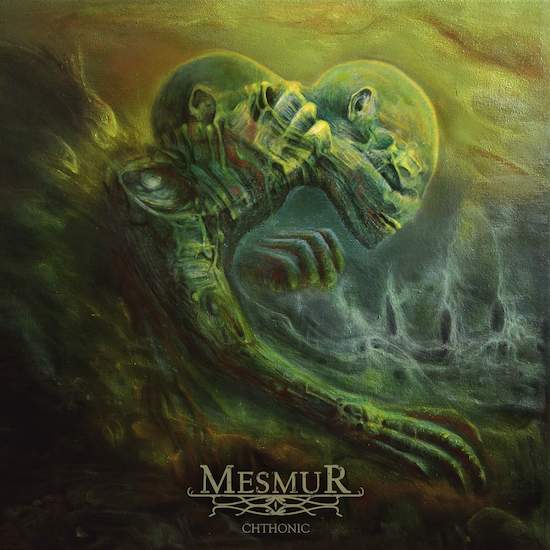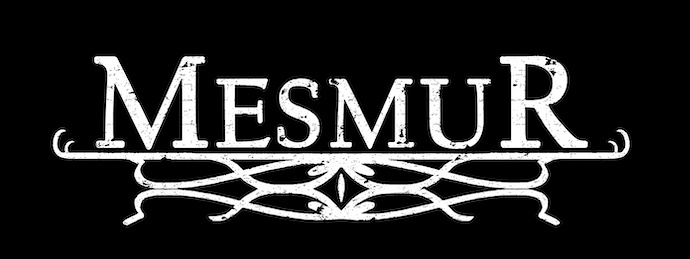
The debate over whether human beings have souls has endured for millennia and will endure for millennia more (assuming humanity survives that long). It has been a mainstay of philosophical and theological discourse, and scientists have intruded as well, with explanations rooted in the chemistry and electricity of the brain.
The debate won’t end, and not just because the hypothesis and its rejection are both un-provable at some level, but also because of the unyielding hope that some essence of us will survive the death of the body. In the midst of all the agonies that life brings our way, many people have always wondered, “Really, is this all there is?“, and with varying degrees of conviction insist, “It can’t be!”
Mesmur‘s new album Chthonic doesn’t directly address this age-old question. Thematically, it’s “a collection of paranormal horror tales” that speak “of fabled entities making contact through the veil of sleep, summoning prey to subterranean depths, or haunting a post-apocalyptic landscape” (to borrow from the PR materials).
And yet the music is so deeply stirring in its effects that it might make some people think it’s connecting with something within that has no physical existence or explanation, but so daunting that it could be understood as delivering the terrible message that nothing survives the end of breath, or that if something does survive it will find that only horror awaits.

From the first moments of the instrumental album opener “Chthonic (Prelude)“, the music casts a heavy pall of agonizing grief. The music, there enhanced by the organ performance of guest Kostas Panagiotou (of the UK funeral doom band Pantheist), moans and wails. It seems to reach out to a spirit world in pleading tones, but the methodical gunshot drums and punishing rhythmic blows (not to mention the harsh and possibly hostile sounds at the end) don’t seem very obliging.
There’s something about that opener that’s both mesmerizing and unsettling, and it won’t be the last time you experience such feelings during the album. Repeatedly, the music crawls and chills, creating sounds of poison and peril or misery and despair, and the reverberations of cavernous roars, gritty growls, and paint-stripping howls make those experiences even more frightening, while the rhythm section inflict spine-shaking and skull-splintering punishment. But on the other end of the spectrum, high shimmering and whistling tones continue providing glimpses of a spirit world.
What makes those experiences even more unsettling is that Mesmur have a formidable talent for making their music sound vast and towering in its scale. They build monuments of downfall and open the mind’s eye to vistas of desolation extending to a far horizon. No hope survives those experiences. Even when they pull back on their crushing might, and give us ethereal synths and guitars, there’s no succor to be found, just more chills for exposed flesh. Mesmur are also equally adept at creating torment and turmoil, especially in those few places where the drumming accelerates and the other instruments channel their own frenzies.
And yet the music is indeed also elegant and mesmerizing, revealing the kind of cold alabaster beauty to be found in ancient cemetery statuary and the otherworldly fascination of ghost lights glimmering in the mist. That experience reaches its apotheosis in the closing track “Chthonic (Coda)“, where Kostas Panagiotou again performs, joining the sounds of symphonic strings to create something truly… celestial… at least until the blood-congealing final moments. For this album, it is indeed a perfect coda.
The songs’ immersive, spellbinding effects even take hold when the music descends into depths of pain and loss. The viola performance in “Passage” and the cello performances in “Petroglyph” (both by Brianne Vieira) play a notable role in that, along with the piercing wail of the lead guitars and the high, spine-tingling radiations of the synths. Even the forlorn, brittle tones of the lone guitars near the middle of of “Passage” create a spell (a very haunting one). One can’t help think of all these ingredients as “soulful” and “soul-stirring”. Surely, mere body chemistry and the reactions of the limbic system can’t explain this.
The album’s title is based on the Greek word for “underworld”, and it’s not hard to also experience the music as a slow excursion through obscure, bleak realms where souls have survived, but only to wander endlessly, experiencing the permanent loss of everything beautiful and cherished in life — and what a horror that would be.
If we have souls, this is the kind of album that powerfully shakes them. However, if they exist and they survive us, Chthonic gives us a portrait of the hereafter that may make you hope the scientists are right. In much more prosaic terms, Mesmur has made an album that I think will stand tall in the annals of funeral doom, not just this year, but for many years to come.
MESMUR‘s lineup on Chthonic:
Jeremy L – Guitars, Synth
Michele M – Bass
John D – Drums
Chris G – Vocals
Chthonic was recorded/engineered by Mesmur, mixed by Jeremy L, and mastered by Evgeny Semenov. The absolutely stunning cover art is the work of Ukrainian artist Vladislav Cadaversky.
The album will be co-released on April 14th by Solitude Productions (Russia) and Aesthetic Death (UK), initially on digipak CD and digital formats, but there are plans for a vinyl release to follow later.
MESMUR
https://mesmur.bandcamp.com/
https://www.facebook.com/mesmurdoom
AESTHETIC DEATH
https://www.aestheticdeath.com/
https://aestheticdeath.bandcamp.com
https://www.facebook.com/aestheticdeath.uk/
SOLITUDE PRODUCTIONS
https://solitudeproductions.bandcamp.com/
https://www.facebook.com/solitudeprod
